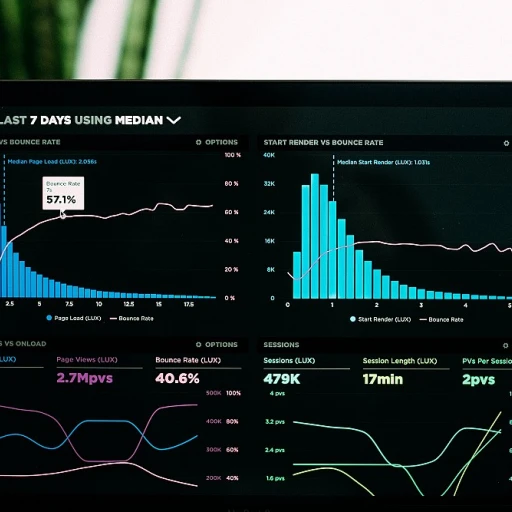
Understanding B2B SEM in the Context of Social Media
Decoding the Relationship between B2B SEM and Social Media Influence
In the rapidly evolving world of digital marketing, understanding B2B search engine marketing (SEM) within social media is crucial for influencers looking to make an impact. This synergy enables social media influencers to foster a more focused approach in reaching and engaging their target audience. The power of SEM lies in its ability to enhance visibility and lead generation through effective use of keywords, well-structured ads, and optimally targeted campaigns.
B2B SEM and social media are not just tools, but strategic platforms that can be leveraged to enhance a marketing strategy. With PPC campaigns and Google Ads, companies can place their products and services directly where their audience frequents most, making it a vital consideration for any aspiring influencer. By understanding these mechanisms, influencers can navigate the complexities of SEM to deliver more effective lead generation and enhance overall quality score of their digital efforts.
A key aspect of this is recognizing the importance of content. In both SEM and social media, content reigns supreme. Influencers must adopt SEM strategies that emphasize valuable and engaging content marketing. This involves crafting compelling landing pages and ad strategies that address the needs of potential leads, ultimately driving business outcomes.
To provide a comprehensive understanding of these dynamics, one can explore how different influencers interact with B2B SEM within their niches. This exploration will aid influencers in aligning their content strategies with the expectations and preferences of their audience while maximizing the benefits of search engine marketing across platforms.
The Role of Influencers in B2B SEM
The Power of Influencers in Navigating B2B SEM
In the realm of B2B marketing, influencers wield a unique power to bridge the gap between brands and their target audience. Their mastery of content creation and engagement offers a remarkable advantage in enhancing search engine marketing (SEM) strategies. By harnessing the credibility and trust they've cultivated, influencers can significantly amplify B2B SEM efforts from both an SEO and paid search perspective.
Influencers are pivotal in driving brand visibility through curated content that resonates with specific audiences. Their influence can refine keyword strategies, ensuring that marketing campaigns like pay-per-click (PPC) ads effectively reach potential business leads. Careful selection of keywords and adaptation to industry-specific language can heighten a product or service's visibility in search engine results.
Building Credibility and Authority in B2B SEM
The credibility that influencers bring to the table enhances the authority of the business in a landscape crowded with competitors. They offer insights and expertise that can be leveraged to develop robust SEM campaigns that capture an audience's attention and convert leads into business opportunities. By collaborating with influencers, businesses can enhance their online presence and improve their quality score in search engines.
Incorporating influencers into B2B SEM strategies can also provide a dynamic range of content across digital platforms. This diversity helps to maintain audience engagement while satisfying the search engine algorithms that favor fresh, authoritative content. Influencers can help maintain a balance between organic growth through SEO techniques and orchestrated paid search efforts.
Enhancing SEM Campaigns through Influencer Collaboration
Influencers contribute significantly to SEM campaigns, known for creating engaging and relevant digital content that communicates effectively with industry-specific audiences. When intertwined with a strategic approach to SEM, this content can greatly enhance both the visibility and credibility of a business's offerings, be they products or services.
Through collaboration with influencers, businesses can refine their target audience strategies on platforms like Google Ads. This partnership can be key to creating impactful campaigns with optimized landing pages that convert visitors to leads. Furthermore, influencer insights into market trends become assets for developing innovative SEM strategies that resonate well within the industry.
For a deeper dive into the integration of influencer efforts and LinkedIn as a platform for B2B SEM success, explore the importance of cultivating leadership presence with a robust LinkedIn strategy.
Strategies for Effective B2B SEM on Social Media
Adapting SEM Strategies for Social Media Platforms
When delving into Business-to-Business (B2B) Search Engine Marketing (SEM) on social media, it's essential to tailor your strategies to leverage the unique dynamics of these platforms. Social media presents a distinct environment compared to traditional search engine platforms, necessitating a refined approach to maximize effectiveness.
Integration of Targeted Keywords and Content
One of the core components of any SEM strategy is the adept use of keywords. For B2B social media campaigns, identify specific, targeted keywords that align with both your content marketing goals and the interests of your target audience. Strategically incorporate these keywords into your content and ads to enhance visibility and engagement. Tapping into the power of SEO, focus on crafting content that not only informs but also captivates, facilitating better quality scores and by extension, improved ad placement.
The Role of PPC and Google Ads
Leveraging Pay-Per-Click (PPC) campaigns via platforms such as Google Ads is crucial for reaching professionals actively seeking services and products in the B2B space. Effective paid search campaigns can drive significant lead generation, making Google and other search engines an invaluable part of the digital marketing mix. While formulating these campaigns, emphasize business solutions in your marketing strategy to accurately meet the needs of B2B audiences.
Leveraging SEM Agencies and Tools
For influencers looking to optimize their reach in B2B SEM, collaborating with specialized SEM agencies can provide a strategic edge. These agencies have expertise in managing campaigns across digital platforms, ensuring your efforts are aligned with best practices. Additionally, make use of tools designed to track SEM metrics, helping refine campaigns through data-driven insights.
Enhancing Landing Pages and Content
A significant aspect of SEM on social media is the creation of compelling landing pages that resonate with your audience. These pages should be designed with clear calls-to-action and optimized for conversion. Whether dealing in SaaS products or other business services, the goal is to convert visitors from your digital ads into leads effectively. By focusing on creating a seamless user experience, marketers can significantly boost conversion rates.
Challenges Faced by Influencers in B2B SEM
Overcoming Obstacles in Influencer Marketing SEM
The integration of influencers into B2B Search Engine Marketing strategies is not devoid of challenges. Influencers operating in this space face a unique set of obstacles compared to their B2C counterparts, particularly due to the complexity inherent in B2B products and services. Below are some of the critical challenges influencers encounter:- Complex B2B Sales Cycles: Unlike consumer-focused campaigns, B2B sales often involve multiple decision-makers and extensive sales cycles. This means that influencers need to maintain engagement over a more extended period to move potential leads through the funnel effectively.
- Niche Target Audience: Reaching the right audience is crucial for the success of any B2B SEM strategy. Influencers must thoroughly understand the specific sectors they are targeting, which requires in-depth research into industry-specific keywords and digital marketing strategies to ensure the right fit for the campaign objectives.
- Creating Relevant Content: B2B buyers demand high-quality, informative content that demonstrates the value of a service or SaaS product. Influencers must possess the capability to craft engaging content that aligns with the needs and interests of business audiences while also incorporating all necessary SEO and online search requirements.
- Adapting to Paid Search Dynamics: With B2B paid search and Google Ads playing a pivotal role in any robust SEM strategy, influencers must navigate these platforms adeptly. Understanding the nuances of PPC campaigns, from keyword choice to landing page optimization, is crucial for achieving higher quality scores and, subsequently, lead generation.
- Measuring Campaign Success: Finally, influencers often struggle with adequately measuring the success of their SEM campaigns. Establishing clear metrics and KPIs related to lead quality, conversion rates, and brand visibility is vital in demonstrating the campaign's impact and effectiveness.
Tools and Platforms for B2B SEM Success
Essential Platforms and Tools for SEM Success
Navigating the digital marketing landscape requires the right blend of tools to enhance search engine marketing efforts. When aiming to maximize B2B SEM results, particularly for social media influencers, an array of platforms and technologies can streamline processes and elevate outcomes. Let’s explore some indispensable options.- Google Ads: As a cornerstone for paid search, Google Ads offers invaluable insights for crafting effective SEM campaigns. It allows influencers to target specific audiences, optimizing the reach of their products and services through strategically placed ads.
- SEO Tools: Platforms like Moz or SEMrush provide comprehensive analytics. They assist influencers in understanding keyword performance, improving quality scores, and refining the SEO strategies crucial for generating leads and enhancing visibility on search engines.
- Landing Page Builders: Efficient services such as Unbounce or Leadpages can transform the engagement across campaigns. Tailored, high-conversion landing pages play a pivotal role in guiding potential leads through a compelling journey that aligns with marketing strategies.
- Analytics Solutions: Tools like Google Analytics are imperative for assessing the success of digital marketing efforts. These insights inform the refinement of marketing sem strategies, ensuring continuous improvement.
- PPC Management Software: Platforms such as Adobe Advertising Cloud help automate and optimize pay-per-click campaigns, offering strategic management of digital advertising budgets.
Measuring Success in B2B SEM for Influencers
Key Metrics for Tracking B2B SEM Success
Measuring the success of B2B SEM for social media influencers involves a combination of qualitative and quantitative analysis. Success is not just about achieving one metric but rather understanding how various metrics interplay to reflect an overall effective strategy. Here’s how you can gauge performance:- Return on Investment (ROI): This is one of the most crucial metrics to evaluate. Calculate ROI by comparing the revenue generated against the costs involved in SEM campaigns. It helps determine the profitability of your marketing efforts.
- Quality Score: In Google Ads, the Quality Score is essential. It reflects the relevance and quality of your keywords, ads, and landing pages. A higher quality score usually means better ad positioning and lower costs per click.
- Click-Through Rate (CTR): This metric measures the effectiveness of your ad copy and keywords. A high CTR indicates that your ad is engaging and relevant to the target audience.
- Conversion Rate: This is critical for understanding how well your SEM campaigns are converting traffic into leads or sales. It’s an indicator of how effectively your landing pages are optimized.
- Cost Per Acquisition (CPA): Knowing your CPA allows you to assess how much you’re spending to acquire a new lead or customer through SEM campaigns. A lower CPA suggests cost-effective advertising.
- Lead Quality and Quantity: Measuring the number of leads is important, but the quality of these leads determines the overall success. Strategies should focus on attracting high-potential leads who are likely to convert into business opportunities.
Analyzing Engagement Through SEM
Engagement metrics are vital, especially in a B2B context. They differ from those you would focus on in a more generalized or B2C SEM strategy. Here are a few ways to analyze engagement:- Bounce Rate: This measures the percentage of visitors who leave the site after viewing only one page. A high bounce rate could indicate that the landing page isn’t resonating with the audience.
- Page Views: Track how many pages are viewed per session. This can give insights into engagement levels and the quality of the visitor experience.
- Time on Site: Understand how long visitors are staying on your site. Longer durations might suggest engaging content that interests the target audience.













